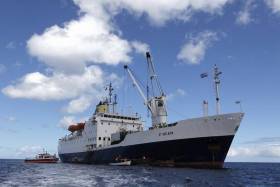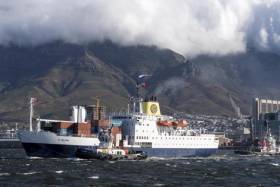Displaying items by tag: Final Farewell Voyage
RMS Ship Runs Out of Steam as St. Helena Island’s Airport takes Off
#Ports&Shipping - RMS St.Helena, the last ship from a mighty fleet that once bound Britain’s scattered empire together will arrive today (Monday, 29 January) after its final voyage to St Helena.
As the UK newspaper, The Times reports the isolated British overseas island territory in the Atlantic Ocean that for hundreds of years was accessible only by sea.
RMS St Helena, one of only two ocean-going vessels that still bear the title “Royal Mail Ship”, will end a final five-day journey from Cape Town, South Africa (haven departed last Wednesday) The unique occasion has been marked by pipe bands, ceremonies and an outpouring of nostalgia.
A flotilla of small boats, the British governor and a huge crowd will greet the ship as she anchors in the bay off Jamestown, the capital.
There will be parties aboard and tours of the ship that for 27 years was the island’s only…to read more click here. Note registration is required to continue further reading of the story.
Afloat.ie can update to confirm according to AIS tracking, that the St. Helena Line passenger-cargsoship is currently at anchorage offshore of the remote island. Next month the only scheduled sea connection will be served exclusively by a cargo-only containership.
During a reception held on board the RMS St. Helena's final (and only) farewell visit to London in 2016, the topic of the ship's replacement was discussed with Afloat from representatives of AW Ship Management. It was disclosed then that a German containership would be taken under contract to continue St. Helena operations based out of Cape Town and also maintain serving Ascension Island. The ship in question is the former Eemslift Christian, renamed Helena which is to begin the new cargo-only service. More on this to appear on Ports & Shipping news.
As for the Islanders or 'Saints' as they call themselves and tourists alike, they have since October last year had the option of taking commercial flights to and from South Africa to the island's first ever airport. The facility caused much controversary given delays arising from safety concerns of aircraft using the runway but were finally resolved. The airport is a game-changer in terms of tourism opportunities and developing new business links.
Among a programme of events to mark the historic farewell voyage on St. Helena, according to the island Government's website will start next week on Tuesday, 6 February, with a Thanksgiving Service at St James’ Church. The service starts at 7pm and all are invited to attend. Following the service the RMS crew will proceed to the Seafront for a Blessing.
A special RMS Open Day will be held on Friday, 9 February, which will allow the Saints a final opportunity to view the ship based on those who have already made a booking. The public viewing will permit access to the bridge overlooking the cargodeck, the passenger facilities and several cabins. Invariably this will prove to be an emotional day.
Celebrations on the Seafront will start at 3pm and will include a local market, RMS entertainment, an exciting performance by the RMS Amateur Dramatics Society and live music by various local bands. Festivities will continue until midnight.
The RMS St. Helena will depart for the very last time when a final voyage from St. Helena is on Saturday, 10 February and returning to the South African port. This will truly be an end of era not just for the Saints but as part of world maritime history.
Royal Mail Ship Embarks on Final Voyage to St Helena
#Ports&Shipping - RMS St Helena, a UK flagged Royal Mail Ship as previously reported on Afloat, that was once a lifeline to the outside world for St Helena is making its last voyage to the remote South Atlantic island where Napoleon died in exile.
According to Gazette News, RMS St Helena’s route for the last three decades is being phased out because a South African airline started a weekly commercial flight in October after the delayed opening of an airport on the volcanic island, and flights could become more frequent if there is demand.
Until last year, the “royal mail” vessel had been the only regular way to reach British-ruled St Helena for passengers who spent nearly a week at sea after departure from the South African city of Cape Town.
Ahead of the ship’s final departure from Cape Town on Wednesday, diplomats, tourism officials and crew members mingled at an on-board reception.
To read more of this historic farewell unique passenger-cargo voyage and photos click here.






























































